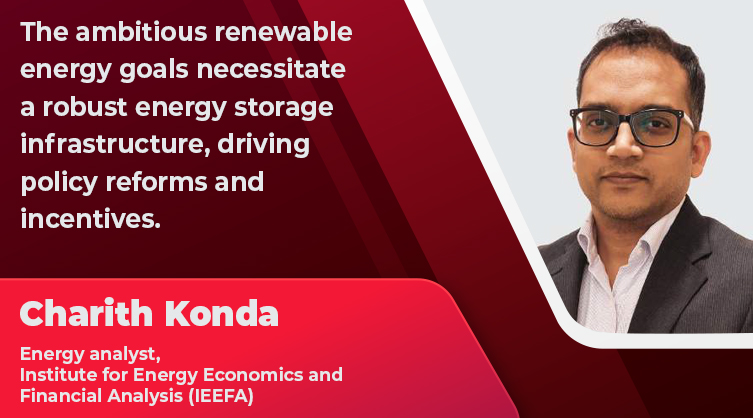Our Energy storage systems framework to boost the sector
By EPR Magazine Editorial September 26, 2023 2:24 pm IST
By EPR Magazine Editorial September 26, 2023 2:24 pm IST

The ambitious renewable energy goals necessitate a robust energy storage infrastructure, driving policy reforms and incentives.
India’s power generation planning studies estimate that the country will need an energy storage capacity of 73.93 gigawatts (GW) by 2031-32, with 411.4 gigawatt hours (GWh) storage to integrate planned renewable energy capacities. This includes 26.69GW/175.18GWh of pumped hydro storage plants (PSPs) and 47.24GW/236.22GWh of battery energy storage systems (BESS).
India aims to increase its renewable power generation capacity in the next ten years, from about 177 GW by mid-2023 to about 596 GW by March 2032. However, to integrate such large shares of renewable energy, India would need a new power sector structure that includes demand management measures, a well-connected national grid, effective energy storage technologies, and flexible operation of the existing fossil fuel fleet.
With their ability to provide grid management services, energy storage technologies could play a critical role in India’s energy transition. The government is also encouraging the growth of this sector through various policies and interventions.
Energy storage systems framework a boost for the sector
India’s national power sector planning now includes two prominent energy storage technologies – PSPs and BESS. The government recently published a framework for Energy Storage Systems (ESS) to promote the adoption of energy storage in the power sector. The framework aims to support the development of ESS through policy and regulatory measures, financial incentives, and performance-based incentives.
Some of the notable previous policies that were ratified in this framework include a legal status of the independent ESS, an Energy Storage Obligation (ESO) on obligated entities, such as distribution utilities, waiver of inter-state transmission system charges, and eligibility of BESS projects to participate in High Price Day Ahead power Market (HP-DAM). Together, these policies can accelerate the deployment of ESS. For example, the legal status of independent ESS projects in the power system will enable the deployment of independent ESS projects to provide energy storage as a service.
The ESO specified a minimum percentage of electricity consumption within a distribution utilities area to be procured from renewable energy through ESS. The gradual increase of ESO will facilitate the deployment of ESS in a timely fashion as costs decline. Also, the eligibility of ESS projects to participate in HP-DAM will allow these projects to engage in energy arbitrage activities, which would help, particularly BESS projects, to gain economic viability.This month, the government also approved a viability gap funding of Rs 37.6 billion to provide financial support of up to 40% of the capital cost of BESS projects, amounting to 4,000 megawatt hours. The government aims to reduce the levelled storage cost through this support mechanism.
Taxation and pricing
The government needs to streamline taxation on energy storage projects. There are some discrepancies – for instance, a GST of 18-28 PERCENT is levied on PSP project components, while a GST of 12% is levied on Wind and Solar project components.
State regulatory commissions must notify the peak and off-peak tariffs or differential pricing mechanisms for PSPs following the guidelines issued by the Union government to develop PSPs. This will improve the economic viability of PSPs and help in deployment.
Finally, developing real-time markets will allow storage projects, especially BESS, to provide multiple ancillary services to the grid, improving the overall project economics.
– Charith Konda, Energy analyst, Institute for Energy Economics and Financial Analysis (IEEFA)
We use cookies to personalize your experience. By continuing to visit this website you agree to our Terms & Conditions, Privacy Policy and Cookie Policy.